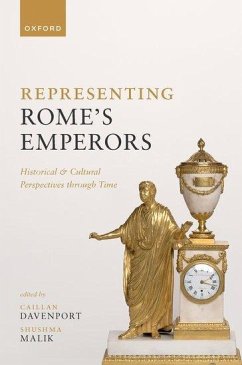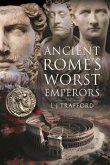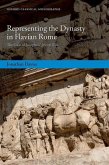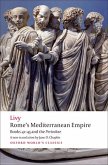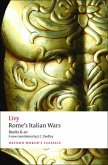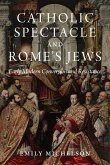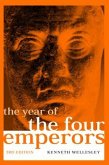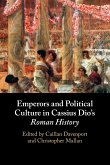Representing Rome's Emperors
Historical and Cultural Perspectives Through Time
Herausgeber: Davenport, Caillan; Malik, Shushma
Representing Rome's Emperors
Historical and Cultural Perspectives Through Time
Herausgeber: Davenport, Caillan; Malik, Shushma
- Gebundenes Buch
- Merkliste
- Auf die Merkliste
- Bewerten Bewerten
- Teilen
- Produkt teilen
- Produkterinnerung
- Produkterinnerung
Representing Rome's Emperors brings together an international team of experts to examine the literary and artistic representations of Roman emperors across more than two thousand years of history, breaking down traditional disciplinary boundaries that have separated the study of emperors in antiquity from their representation in later periods.
Andere Kunden interessierten sich auch für
![Ancient Rome's Worst Emperors Ancient Rome's Worst Emperors]() L J TraffordAncient Rome's Worst Emperors20,99 €
L J TraffordAncient Rome's Worst Emperors20,99 €![Representing the Dynasty in Flavian Rome Representing the Dynasty in Flavian Rome]() Dr Jonathan Davies (Lecturer in Ancien Lecturer in Ancient HistoryRepresenting the Dynasty in Flavian Rome95,99 €
Dr Jonathan Davies (Lecturer in Ancien Lecturer in Ancient HistoryRepresenting the Dynasty in Flavian Rome95,99 €![Rome's Mediterranean Empire Rome's Mediterranean Empire]() LivyRome's Mediterranean Empire23,99 €
LivyRome's Mediterranean Empire23,99 €![Rome's Italian Wars Rome's Italian Wars]() LivyRome's Italian Wars20,99 €
LivyRome's Italian Wars20,99 €![Catholic Spectacle and Rome's Jews Catholic Spectacle and Rome's Jews]() Dr Emily MichelsonCatholic Spectacle and Rome's Jews30,99 €
Dr Emily MichelsonCatholic Spectacle and Rome's Jews30,99 €![Year of the Four Emperors Year of the Four Emperors]() Kenneth WellesleyYear of the Four Emperors56,99 €
Kenneth WellesleyYear of the Four Emperors56,99 €![Emperors and Political Culture in Cassius Dio's Roman History Emperors and Political Culture in Cassius Dio's Roman History]() Emperors and Political Culture in Cassius Dio's Roman History36,99 €
Emperors and Political Culture in Cassius Dio's Roman History36,99 €-
-
-
Representing Rome's Emperors brings together an international team of experts to examine the literary and artistic representations of Roman emperors across more than two thousand years of history, breaking down traditional disciplinary boundaries that have separated the study of emperors in antiquity from their representation in later periods.
Hinweis: Dieser Artikel kann nur an eine deutsche Lieferadresse ausgeliefert werden.
Hinweis: Dieser Artikel kann nur an eine deutsche Lieferadresse ausgeliefert werden.
Produktdetails
- Produktdetails
- Verlag: Oxford University Press
- Seitenzahl: 352
- Erscheinungstermin: 8. Mai 2024
- Englisch
- Abmessung: 224mm x 150mm x 25mm
- Gewicht: 716g
- ISBN-13: 9780192869265
- ISBN-10: 0192869264
- Artikelnr.: 69191962
- Herstellerkennzeichnung
- Libri GmbH
- Europaallee 1
- 36244 Bad Hersfeld
- gpsr@libri.de
- Verlag: Oxford University Press
- Seitenzahl: 352
- Erscheinungstermin: 8. Mai 2024
- Englisch
- Abmessung: 224mm x 150mm x 25mm
- Gewicht: 716g
- ISBN-13: 9780192869265
- ISBN-10: 0192869264
- Artikelnr.: 69191962
- Herstellerkennzeichnung
- Libri GmbH
- Europaallee 1
- 36244 Bad Hersfeld
- gpsr@libri.de
Caillan Davenport is Associate Professor of Classics and Head of the Centre for Classical Studies at The Australian National University. He was educated at the University of Queensland and the University of Oxford before holding posts at Queensland, Macquarie University, and ANU. He has received an Australian Research Council Discovery Early Career Award and an Alexander von Humboldt Foundation Fellowship for Experienced Researchers. He is the author of A History of the Roman Equestrian Order (2019), which won the Royal Historical Society's Gladstone Prize. Shushma Malik is Assistant Professor of Classics at the University of Cambridge, and Onassis Classics Fellow at Newnham College, Cambridge. She graduated with a PhD in Classics from the University of Bristol in 2013, and since then has held posts at the Universities of Manchester, Queensland, Roehampton, and Cambridge. She has research expertise in imperial Rome and its reception, and is author of The Nero-Antichrist: Founding and Fashioning a Paradigm (2020). From 2020-2023, Shushma was Co-Investigator on a research project co-funded by the AHRC (UK) and DFG (Germany) on the study of ancient corruption.
* 1: Caillan Davenport and Shushma Malik: Introduction
* 2: Rhiannon Ash: Tiberius in Space: Proxemics and the Portrayal of
the Princeps
* 3: Eleanor Cowan: Julio-Claudian Emperors as Fathers and Sons
* 4: Estelle Strazdins: Herodes Atticus, Hadrian, and the Antonines:
Mediating Power and Self-Promotion in Achaea through Public and
Private Display
* 5: Lucy Grig: Looking for Representations of Emperors in Late Antique
Popular Culture
* 6: Meaghan McEvoy: Educating Theodosius II: Theodosian Child-Emperors
and the Manipulation of the Imperial Image
* 7: M. Shane Bjornlie: Jordanes and the End of the Roman Empire
* 8: Filippo Carlà-Uhink: 'Per voler del primo amor ch'i' sento':
Justinian and Theodora from the Sixth to Sixteenth Centuries
* 9: Frances Muecke: The Humanists and the Emperors: The Case of Biondo
Flavio (1392-1463)
* 10: Shushma Malik: Roman Emperors in Montesquieu's Considerations
* 11: Penelope Goodman: Retrospective Parentage: Augustus as a Father
of Europe
* 12: David Scourfield: Fictions of Power: Thornton Wilder's The Ides
of March and John Williams' Augustus
* 13: Caillan Davenport and Shushma Malik: Epilogue: Towards a
Methodology of Representation
* 2: Rhiannon Ash: Tiberius in Space: Proxemics and the Portrayal of
the Princeps
* 3: Eleanor Cowan: Julio-Claudian Emperors as Fathers and Sons
* 4: Estelle Strazdins: Herodes Atticus, Hadrian, and the Antonines:
Mediating Power and Self-Promotion in Achaea through Public and
Private Display
* 5: Lucy Grig: Looking for Representations of Emperors in Late Antique
Popular Culture
* 6: Meaghan McEvoy: Educating Theodosius II: Theodosian Child-Emperors
and the Manipulation of the Imperial Image
* 7: M. Shane Bjornlie: Jordanes and the End of the Roman Empire
* 8: Filippo Carlà-Uhink: 'Per voler del primo amor ch'i' sento':
Justinian and Theodora from the Sixth to Sixteenth Centuries
* 9: Frances Muecke: The Humanists and the Emperors: The Case of Biondo
Flavio (1392-1463)
* 10: Shushma Malik: Roman Emperors in Montesquieu's Considerations
* 11: Penelope Goodman: Retrospective Parentage: Augustus as a Father
of Europe
* 12: David Scourfield: Fictions of Power: Thornton Wilder's The Ides
of March and John Williams' Augustus
* 13: Caillan Davenport and Shushma Malik: Epilogue: Towards a
Methodology of Representation
* 1: Caillan Davenport and Shushma Malik: Introduction
* 2: Rhiannon Ash: Tiberius in Space: Proxemics and the Portrayal of
the Princeps
* 3: Eleanor Cowan: Julio-Claudian Emperors as Fathers and Sons
* 4: Estelle Strazdins: Herodes Atticus, Hadrian, and the Antonines:
Mediating Power and Self-Promotion in Achaea through Public and
Private Display
* 5: Lucy Grig: Looking for Representations of Emperors in Late Antique
Popular Culture
* 6: Meaghan McEvoy: Educating Theodosius II: Theodosian Child-Emperors
and the Manipulation of the Imperial Image
* 7: M. Shane Bjornlie: Jordanes and the End of the Roman Empire
* 8: Filippo Carlà-Uhink: 'Per voler del primo amor ch'i' sento':
Justinian and Theodora from the Sixth to Sixteenth Centuries
* 9: Frances Muecke: The Humanists and the Emperors: The Case of Biondo
Flavio (1392-1463)
* 10: Shushma Malik: Roman Emperors in Montesquieu's Considerations
* 11: Penelope Goodman: Retrospective Parentage: Augustus as a Father
of Europe
* 12: David Scourfield: Fictions of Power: Thornton Wilder's The Ides
of March and John Williams' Augustus
* 13: Caillan Davenport and Shushma Malik: Epilogue: Towards a
Methodology of Representation
* 2: Rhiannon Ash: Tiberius in Space: Proxemics and the Portrayal of
the Princeps
* 3: Eleanor Cowan: Julio-Claudian Emperors as Fathers and Sons
* 4: Estelle Strazdins: Herodes Atticus, Hadrian, and the Antonines:
Mediating Power and Self-Promotion in Achaea through Public and
Private Display
* 5: Lucy Grig: Looking for Representations of Emperors in Late Antique
Popular Culture
* 6: Meaghan McEvoy: Educating Theodosius II: Theodosian Child-Emperors
and the Manipulation of the Imperial Image
* 7: M. Shane Bjornlie: Jordanes and the End of the Roman Empire
* 8: Filippo Carlà-Uhink: 'Per voler del primo amor ch'i' sento':
Justinian and Theodora from the Sixth to Sixteenth Centuries
* 9: Frances Muecke: The Humanists and the Emperors: The Case of Biondo
Flavio (1392-1463)
* 10: Shushma Malik: Roman Emperors in Montesquieu's Considerations
* 11: Penelope Goodman: Retrospective Parentage: Augustus as a Father
of Europe
* 12: David Scourfield: Fictions of Power: Thornton Wilder's The Ides
of March and John Williams' Augustus
* 13: Caillan Davenport and Shushma Malik: Epilogue: Towards a
Methodology of Representation

